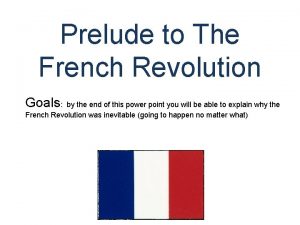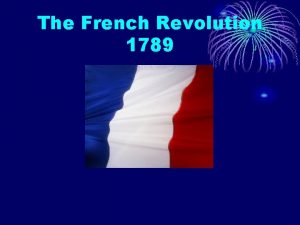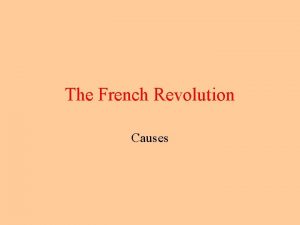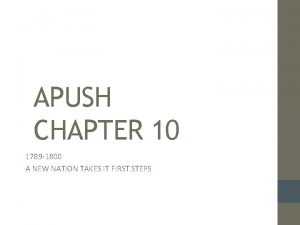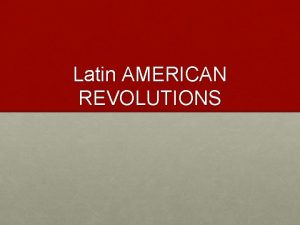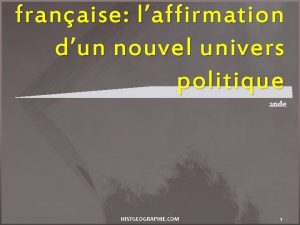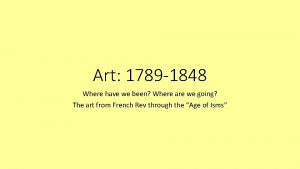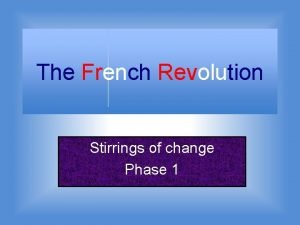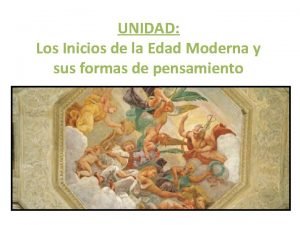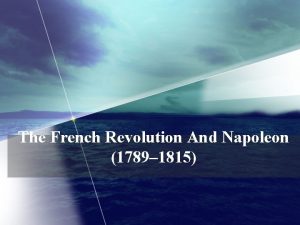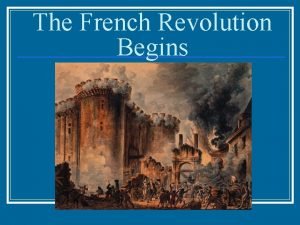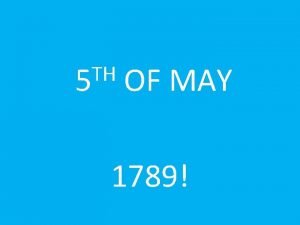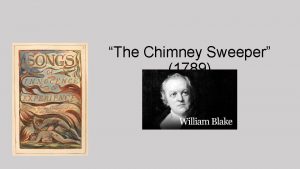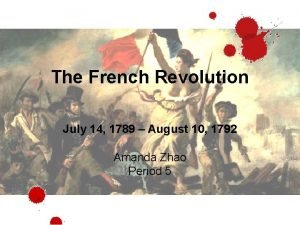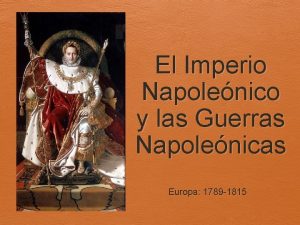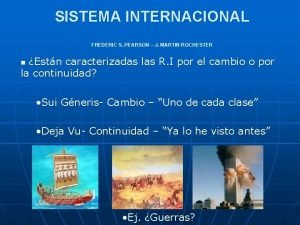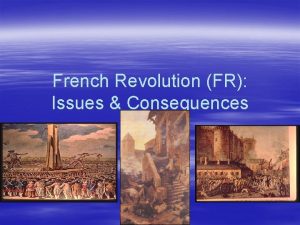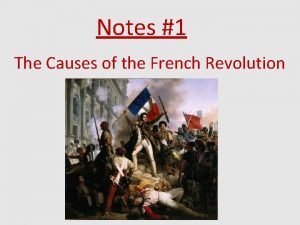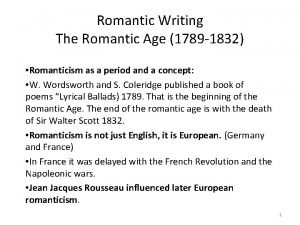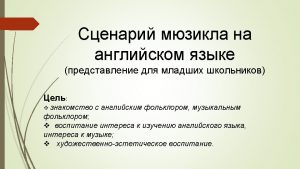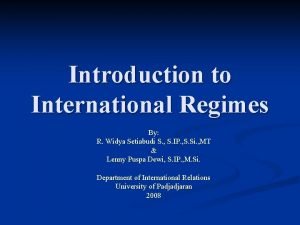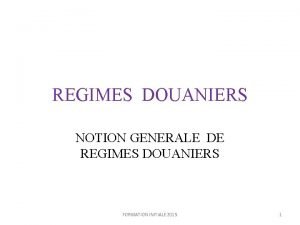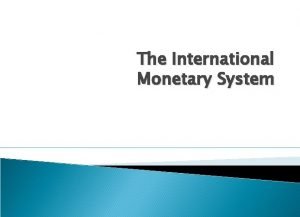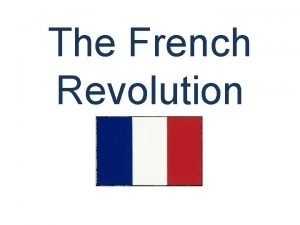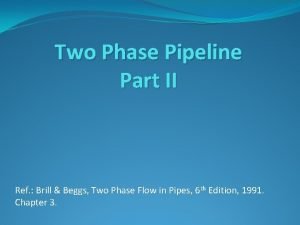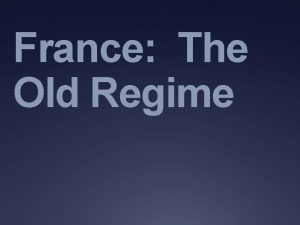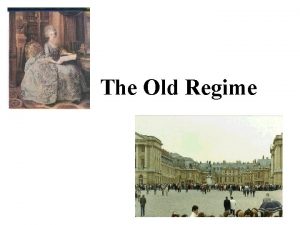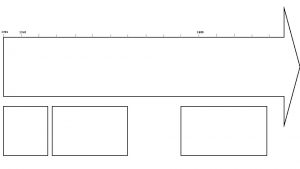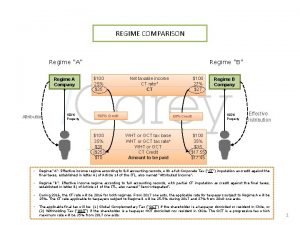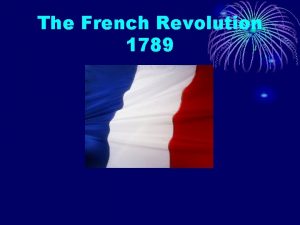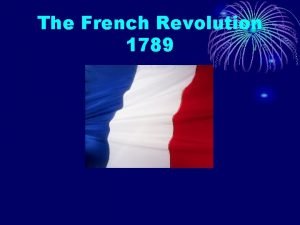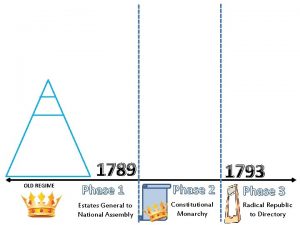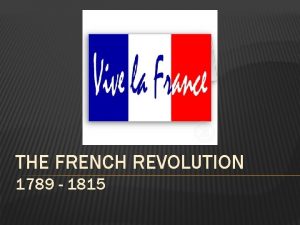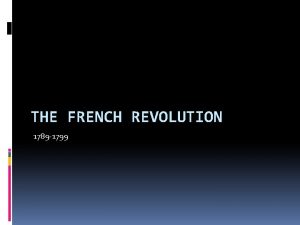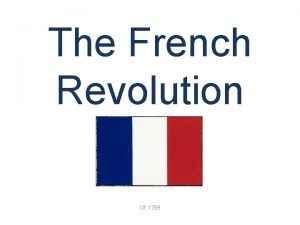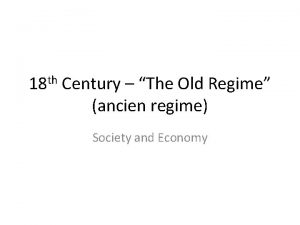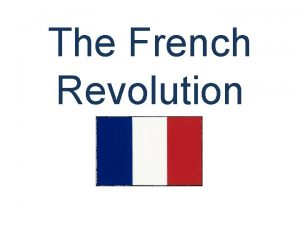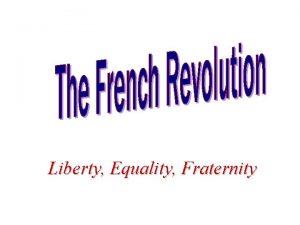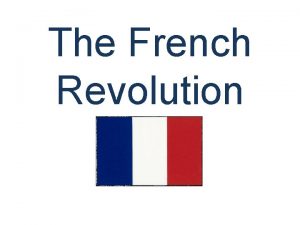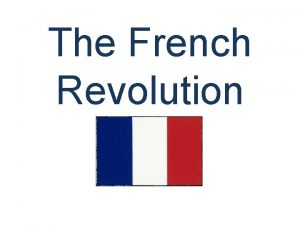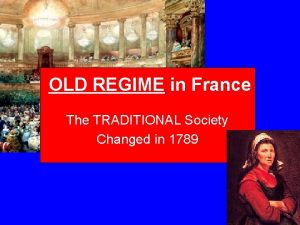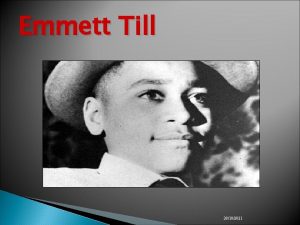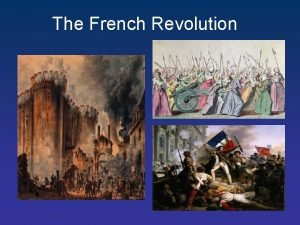The Old Regime In 1789 France was till





































- Slides: 37


The Old Regime • In 1789 France was till clinging to the outdated social system of the Middle Ages where everyone belonged to one of three classes • First Estate: the Clergy • Second Estate: the nobility • Third Estate: majority of the population

The Third Estate • The Third Estate was made up of 98% of the French population • This diverse group was made up of several smaller groups • Top Group was the bourgeoisie or middle class which included bankers, merchants, manufacturers, official royal bureaucracy, lawyers, doctors, journalists professors and skilled artisans • Biggest Group with 9 out of 10 people in France was the rural peasants with some being landowners who hire laborers to work for them or day laborers • Poorest Group: urban workers such as apprentices, journeymen, industry workers in printing or servants, stable hands, porters, construction workers or street sellers and the many urban unemployed who were forced to turn to begging or crime

Discontent • All members of the Third Estate resented the privileges enjoyed by their social betters • “What They Resented” • Wealthy bourgeois could buy political offices and titles but best jobs were reserved for nobles • Urban Workers earned miserable wages so even the smallest rise in bread prices could threaten hunger or starvation • Peasants were burdened by taxes on everything. They may be technically free but many owned fees and service dating back to medieval times even old rules about only nobles may hunt • People in towns began learning of Enlightenment ideas which led them to question the inequalities, • why should the first estates have such privileges at the expense of the majority

Causes of French Revolution • Monarchy: absolute rule, debt from previous kings, heavy spending on court and wars, failure to make reforms • French Society: Third estate burden with taxes, overall discontent of third estate • Economic issues: France’s heavy debt, high interest rates, low wages • Enlightenment Ideas: the spread of Enlightenment ideas or freedom, equality • Poor harvests: poor harvests drive up the price of food, risks of starvation for some • Failure of reforms: failure to take Necker advice, not taxing all estates, taxes and tariffs inside France • Origins of FR History ch. 4 min: http: //www. history. com/topics/frenchrevolution/videos/origins-of-the-french-revolution

Tennis Court Oath • Since only propertied men most of the Third Estate was made up of • + middle class officials • + Lawyers • + writers • They were familiar with the writings of Voltaire and Rousseau and came prepared to solve the finical crisis and insist on: • All three Estates meet in May 1789 • First Problem: the issue of voting • In the past each group had one vote so under this system • the First and Second estates would always out vote the Third Estates two to one Third Estate wanted all Estates to meet in a single body with votes counted by head • The Third estate claiming they represent the people of France called themselves the National Assembly and invited delegates from the other estates to help them write a constitution. Describing the basic rules and allows of government

Tennis Court Oath • The National Assembly found themselves locked out to the meeting all and met across the street at an indoor tennis court and too the famous Tennis Court Oath vowing to never separate and continue meeting until they establish a just and sound constitution

Storming the Bastille • On July 14 th on the streets of Paris rumors of royal troops coming to occupy the capital sent over 800 Parisians to gather in font of the Bastille, a grim medieval fortress used as a prison • The crowd demanded weapons and gun powder they believed was stored there • The commander of the Bastille refused to open the doors but then opened fire on the crowd. • A battle followed with the crowd breaking into the Bastille and killing the commander and the five guards and released the handful of prisoners but found no weapons • The storming of the Bastille became a symbol of the French Revolution because it was seen as a blow to tyranny and is still celebrated today on July 14 th, Bastille Day and is a national holiday

Setting the Scene • The Four Phases of the Revolutionary era • 1. (1789 -1791) moderate phase of the National Assembly • 2. (1792 -1793) turned France into a constitutional monarchy • 3. (1793 -1794) a phase of escalating violence led to the Reign of Terror 4. (1793 -1794) periods of reaction against extremism known as the Directory • (1799 -1815) Age of Napoleon • This section is about the moderate start

Women March on Versailles • October 5 thousands of women streamed from Paris to Versailles protesting the price of bread • Much of the protest was aimed at Marie Antoinette for being frivolous and extravagant plus the rumor of her saying “Let them eat cake” which she did not say but it fueled rumors of her • The women refused to leave until Louis came back with them to Paris so the royal family did move back to Paris

Declaration of the Rights of Man • In the first step toward writing a constitution the Assembly issued the Declaration of the Rights of Man and the Citizen, a Bill of Rights • It was modeled in part after the Declaration of Independence • It proclaimed: • all men were born and remain free and equal in rights • they enjoyed natural rights to liberty, property, security, and resistance to oppression • constitutions existed to protect the natural rights of the citizen • male citizens were equal before the law • Frenchmen had an equal right to hold public office • freedom of religion • taxes to be levied according to ability to pay • Its principles captured the French Revolution’s slogan • Louis XVI was slow to accept the reforms causing Parisians to grow suspicious

Reorganizing the Church • The Assembly votes to put the French Catholic Church under state control • Under the Civil Constitution of the Clergy issued in 1790 • clergy became elected, salaried officials • ended papal authority over the French Church • dissolved convents and monasteries • Reaction was swift and angry with many clergy refusing to accept the Civil Constitution, peasants rejected it and a huge gulf opened between the revolutionaries in Paris and the peasantry in the provinces

Constitution of 1791 • The National Assembly produced a constitution in 1791 which was the constitution first 1. set up a limited monarchy 2. a new Legislative Assembly that had power to make laws, collect taxes, and decide on issues of war and peace 3. lawmakers would elected by tax paying male citizens 4. replaced provinces with 83 departments 5. abolished old provincial courts 6. reformed laws 7. protected private property 8. supported free trade 9. compensated nobles for the land seized by peasants 10. abolished guilds 11. forbade urban workers to unionized • To moderate reformers it completed the revolution, reflected Enlightenment goals and means and leisure to serve in government end church interference and ensured and it put power in the hands of men with the

Internal Divisions • In Paris and other urban areas working class men and women called sans-culottes (without short britches) pushed for more radical action, they demanded a Republic or government ruled not by a monarch but by elected representatives • Within the Legislative Assembly several hostile factions competed for power • The sans culottes found support among the more radical Jacobins, a revolutionary political club who were mostly middle class lawyers or intellectuals • Opposing the radicals were moderate reformers and political officials who wanted no more reforms at all

The French Republic • In Paris radicals took control of the Assembly • They called for the election of a new legislative body called the National Convention • Suffrage or the right to vote was to be extended to all male citizens not just property owners • The more radical body voted to abolish the monarchy and to declare France a republic • A new constitution was drawn up erasing all traces of the old order • They seized lands of nobility and abolished

The Convention Defends the Republic • The Republic put Louis XVI on trial and sentenced him to death on January 1793 shocking European monarchs • Marie Antoinette was also executed. Their son, Louis XVII died of unknown causes • History of guillotine 3: 16: http: //www. history. com/topics/fren ch-revolution/videos/coronersreportguillotine? m=528 e 394 da 93 ae&s=un defined&f=1&free=false

Robespierre • Maximilien Robespierre was a lawyer and politician who quickly rose to leader of the Committee of Public Safety • Among Jacobins he earned the nickname incorruptible his enemies called him a tyrant • He embraced Rousseau’s idea of the general will as a source of all legitimate law • He promoted religious toleration • He wanted to abolish slavery • He believed that France could achieve a republic of virtue only through the use of terror which he defined as nothing more than prompt, severe and inflexible justice • Robesppierre 4 min: http: //www. history. com/topics/frenchrevolution/videos/robespierre-and-the-reign-ofterror? m=528 e 394 da 93 ae&s=undefined&f=1&free=false

The Reign of Terror • Maximilien Robespierre was a lawyer and politician who quickly rose to leader of the Committee of Public Safety • the Committee of Public Safety Goal was to keep the revolution going • Within a year the Reign of Terror consumed its own members including Robespierre who was arrested and executed the next day • Robesppierre 4 min: http: //www. history. com/topics/frenchrevolution/videos/robespierre-and-the-reign-ofterror? m=528 e 394 da 93 ae&s=undefined&f=1&free=false

Reaction and the Directory • In reaction to the Terror the revolution entered a third phase • Moderates produced another constitution, the Constitution of 1795, the third since 1789. • The Constitution of 1795 set up a five man directory and a two house legislature elected by male citizens who own property • The middle class professionals of the bourgeoisie was the dominant force in this state of the French Revolution • The Directory held power from 1795 to 1799 • The Directory faced growing discontent • War with Prussia and Spain had ended but war with Austria and Great Britain continued • Corrupt leaders lined their pockets and failed to solve problems • price of bread increased stirring sans-culottes to riot • Many émigrés returned to France and were welcomed by devout Catholics who were angry over actions used against the Church • In 1797 elections supporters of a constitutional monarchy won the majority of seats in the legislature • Politicians turned to Napoleon Bonaparte

Changes in Daily Life • Many changes came from this 10 year long French Revolution • dislodged the old social order • Overthrew the monarchy • Brought the Catholic Church under state power • new symbols like red liberty caps confirmed liberty and equality for all male citizens • the new title citizen applied to people of all social classes • titles were eliminated • elaborate fashions gave way to more practical clothes • revolutionary names went to children like Constitution, Republic or August 10 th

Nationalism • Revolution and war gave the French people a strong sense of national identity • loyalty had shifted from the king to the nation • Nationalism, a strong feeling of pride in and devotion to ones country spread throughout France • https: //www. opened. io/video/the-french-revolutionsung-to-tune-of-bad-romance-bylady/113892? is. Already. Added=false&is. Edit. Mode=false

THE AGE OF NAPOLEON BEGINS • From 1799 to 1815 Napoleon would dominate France and Europe • A hero to some, an evil force to others, he gave his name to the final phase The Age of Napoleon • Napoleon Bonaparte was born in Corsica • his family were minor nobles with little money • at age 9 he was sent to France for a military career • When the revolution broke out he was a 20 year old lieutenant and eager to make a name for himself • He favored the Jacobins and republican rule but found the conflicting ideas of the revolution confusing • 3 min cartoon overview: http: //www. history. com/topics/frenchrevolution/videos/napoleon? m=528 e 394 da 93 ae&s=undefined&f =1&free=false

Early Successes • During the French Revolution Napoleon rose through the ranks quickly winning numerous dazzling victories and managing to hide stories of some of his losses • Success fueled his ambition and by 1799 he moved from victorious general to political leader by helping overthrow a weak Directory and setting up a three man governing board called the Consulate • Another constitution was drawn up and Napoleon took the title of First Consul • In 1802 he named himself Consul for Life • The rise of napoleon History channel 2 min http: //www. history. com/topics/french-revolution/videos/the-rise-ofnapoleon? m=528 e 394 da 93 ae&s=undefined&f=1&free=false

Reforms • • • To restore economic prosperity he controlled prices encouraged new industry built roads and canals To endure well trained officials and military officers he set up a system of public schools. He made peace with the Catholic Church in the Concordat of 1801 The state still kept the Church under state control but recognize religious freedom Napoleon had the support of all the classes He encouraged émigrés to return provided they took an oath of loyalty Peasants supported him because he recognized their right to lands they had bought from the Church and nobles. Middle class supported him because of the economic reforms and the restoration of order, plus he made jobs open to all of talent

Napoleonic Code • The Napoleonic Code was one of his most lasting reforms • It included: • Enlightenment principles such as equality for all citizens before the law • religious toleration • advancement based on merit • Women lost rights under the Napoleonic Code

The Grand Empire • Napoleon created a vast empire • He annexed or added outright some areas to France such as Netherlands, Belgian, parts of Italy and Germany • He abolished the Holy Roman Empire, and created a 38 member Confederation of the Rhine under French protection • He cut Prussian territory in half turning part of Poland into the Grand Duchy of Warsaw • Much of Europe he controlled through forceful diplomacy • He forced alliances on European powers • Napoleon’s success boosted the spirit of nationalism

Napoleon’s Empire

France Versus Britain • Britain alone remained outside Napoleon’s empire • Britain relied on sea power to stop Napoleons drive • In 1805 Napoleon prepared to invade England but at the Battle of Trafalgar near Spain a British admiral named Horatio Nelson defeated the French fleet • With invasion ruled out Napoleon decided to strike a Britain’s commerce • He waged economic warfare called the Continental System by which he closed European ports to British goods • Britain responded with its own blockade or shutting off ports to keep people or supplies from moving in or out of European ports • Both sides seized neutral ships suspected of trading with the other • British attacks on American ships would eventually trigger the War of 1812 • Napoleon’s Continental System failed to bring Britain to its knees • Trade restriction created a scarcity of goods in Europe sending prices soaring and intensified resentment against French power

Challenges to Napoleon’s Empire • Under Napoleon’s armies the ideas of the revolution and the Napoleonic Code spread across Europe • New reforms such as • installing new governments that abolished titles of nobility • ending Church privileges • opening careers to men of talent • ending serfdom and manorial dues • reduced trade barriers • stimulated industry

Impact of Nationalism • While nationalism spurred on French armies it also worked against them too • Even though many Europeans welcomed the ideas of the French Revolution they still saw Napoleon and his armies as foreign oppressors • They resented the Continental System • They resented the effort to impose French culture • Throughout Europe nationalism unleashed revolts against the French

Resistance in Spain • Resistance to France forced the need for large numbers of Napoleon’s troops • In 1808 Napoleon • replaced the king of Spain with his brother Joseph Bonaparte. • sought to undermine the Spanish Catholic Church • When the Spanish people resisted French forces responded with brutal force which further inflamed Spanish nationalism and efforts to drive the French out intensified • Spanish patriots conducted guerilla warfare or hit and run raids against the French (in Spanish guerrilla means little war) • The numerous attacks kept large numbers of French soldiers in Spain when they were need elsewhere • Then the British sent an army under Duke of Wellington to help the Spanish fight France

Defeat in Russia • • • Concerns of Czar Alexander I of Russia Napoleon’s alliance with the Austrian royal family economic effects of the Continental System Napoleon had enlarged the Grand Duchy of Warsaw that bordered Russia These concerns caused the Czar to withdraw from the Continental System In 1812 Napoleon responded by invading Russia Trying to avoid battles with Napoleon, Russia retreated using the “scorched earth ” policy by destroying anything that could be used by Napoleon’s army leaving the French hungry and cold as the Russian winter came When Napoleon entered Moscow he realized he could not feed and supply his army through the long Russian winter so in October he turned to make the 1, 000 mile trip Only 10, 000 of the original 400, 000 men survived “General Winter and General Famine”, rather than Russian bullets have conquered the Grand Army” Napoleon rushed home to Paris to raise a new force History Channel invasion of Russia 5 min: http: //www. history. com/topics/french-revolution/videos/napoleoninvades-russia? m=528 e 394 da 93 ae&s=undefined&f=1&free=false

Battle of Waterloo • Napoleon will rule only for 100 days • The allies reassembled their troops and the armies met near the town of Waterloo in Belgium • British and Prussian forces crushed the French in a day long battle • Again Napoleon was forced into exile and go to St Helena on the island in South Atlantic and this time he would not return • History Channel death of Nap. 4 min: http: //www. history. com/topics/frenchrevolution/videos/the-death-ofnapoleon? m=528 e 394 da 93 ae&s=undefined&f=1&free=false

Legacy of Napoleon died in 1821 but historians have long debated his legacy Some of this changes / impacts in France Napoleonic Code A centralized state with a constitution Elections were expanded Many more citizens had right to property and access to education The French also lost many rights promised to them Changes / impacts in Europe spread ideas of the revolution while he failed to build a French Empire he did spark nationalist feelings across Europe • the abolition of the Holy Roman Empire would lead to the creation of a Germany • sold the US the Louisiana Territory and doubling the size of the US • • •

Congress of Vienna / Gathering of Leaders • Diplomats and heads of sate • The Congress met for 10 sat down at the Congress of months Vienna • While many enjoyed the • to restore the stability and entertainment of it hosted order in Europe by Francis I of Austria the real was done by Prince Clemens von Metternich of Austria, Czar Alexander of Russia and Lord Robert Castlereagh of Britain, France was represented by Prince Charles Tallyrand

Goals of the Congress 1. The chief goal was to create a lasting peace by establishing a balance of power and protecting the system of monarchy 2. The Congress redrew the map of Europe To keep France contained they surrounded it with stronger countries 3. promoted the principle of legitimacy, restoring hereditary monarchs that the French Revolution or Napoleon unseated The Congress failed to foresee how powerful the new force of Nationalism was and redrew the new boundaries without concern for national cultures.

Cause and effect of French Revolution
 What is the old regime in france
What is the old regime in france 1789 france
1789 france Till we meet at jesus feet
Till we meet at jesus feet Old regime 3 estates
Old regime 3 estates Old regime french revolution
Old regime french revolution 1789 apush
1789 apush The divisions in spanish colonial society 1789
The divisions in spanish colonial society 1789 Louis xiv en costume de sacre symboles
Louis xiv en costume de sacre symboles Art 1789
Art 1789 October 6 1789 french revolution
October 6 1789 french revolution Línea de tiempo de la historia
Línea de tiempo de la historia Symbol of the french revolution
Symbol of the french revolution 1797 - 1789
1797 - 1789 Napoleon 1789
Napoleon 1789 1789
1789 Guillotine french revolution political cartoon
Guillotine french revolution political cartoon Cahiers french revolution
Cahiers french revolution The chimney sweeper 1794
The chimney sweeper 1794 July 14 1789
July 14 1789 Europa en 1789
Europa en 1789 Martin rochester
Martin rochester Europe in 1789
Europe in 1789 Causes of french revolution
Causes of french revolution Bolton romanticism amp; politics 1789 1832 download
Bolton romanticism amp; politics 1789 1832 download Against the gods 1789
Against the gods 1789 Immediate cause of french revolution
Immediate cause of french revolution Once upon a time lived
Once upon a time lived Once upon a time there lived an old man and an old woman
Once upon a time there lived an old man and an old woman Once upon a time there lived a very poor boy
Once upon a time there lived a very poor boy What's your name how old are you
What's your name how old are you Widya setiabudi
Widya setiabudi Regime sinusoidale
Regime sinusoidale Regime douanier
Regime douanier The flexible exchange rate regime 1973-present
The flexible exchange rate regime 1973-present Transistor bipolaire en régime dynamique
Transistor bipolaire en régime dynamique Ancient regime
Ancient regime Beggs and brill pressure drop calculation
Beggs and brill pressure drop calculation Gik regime
Gik regime
